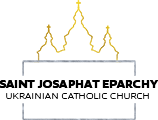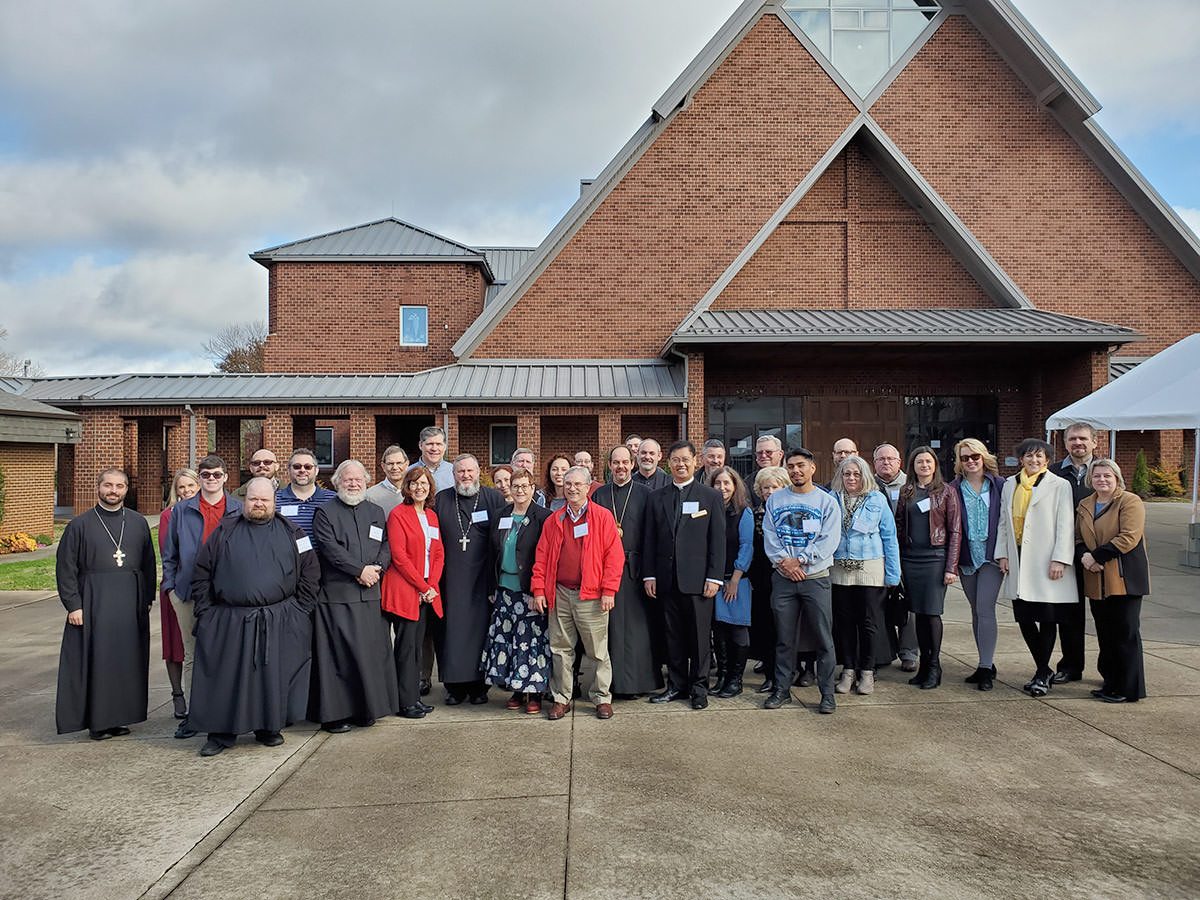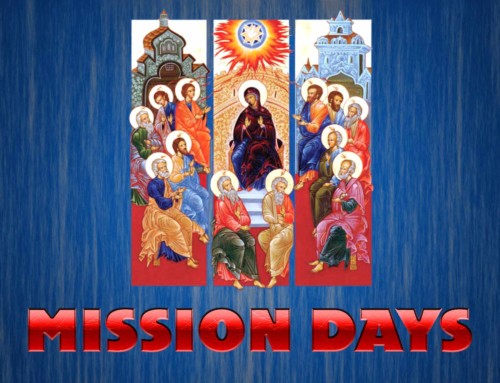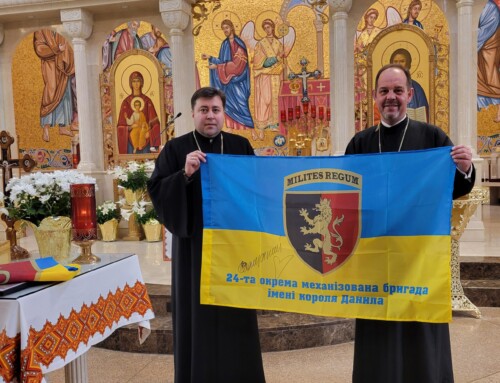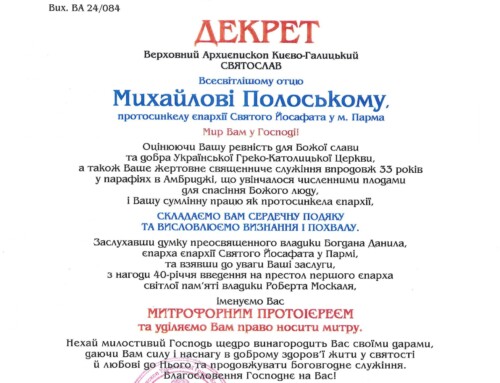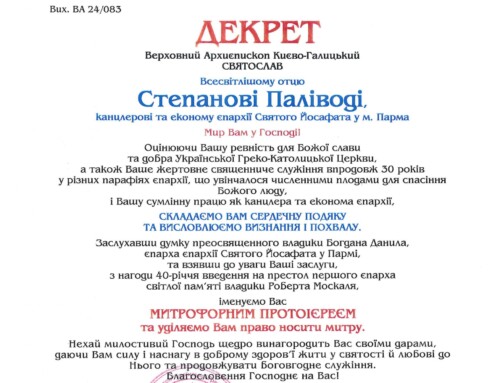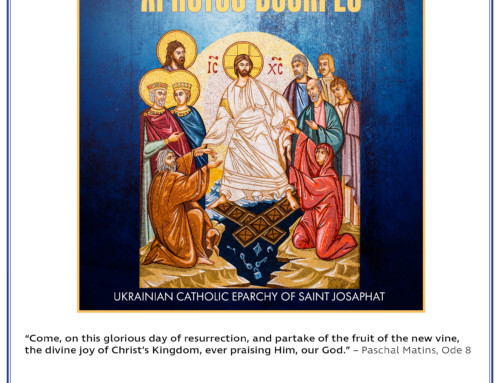St. Josaphat Eparchy in Parma held its third regional convention on the theme of Immigration, Migration, Settlement, and Unity of the Ukrainian Catholic Church on December 14 at St. Basil the Great Parish in Charlotte, North Carolina.
A total of 36 members of the clergy and laity from the Mid-Atlantic Deanery attended the convention in advance of the 2020 Patriarchal Sobor in Lviv, Ukraine, to discuss the unique challenges and opportunities facing the 10 parishes and missions in a region of the United States that includes three of the top 10 states in numeric growth according to the U.S. Census.
The Mid-Atlantic Deanery has parishes and missions in major cities of North Carolina, South Carolina, Georgia, and Tennessee.
To open the convention Bishop Bohdan J. Danylo, head of St. Josaphat Eparchy, asked clergy and laity to meditate on a personal examination of conscience and an examination for a parish community concerning how each person strives to promote a spirit of unity, peace, and harmony at the parish level and the type of atmosphere and community found in their parish or mission.
Bishop Bohdan then asked participants to discuss three sets of questions concerning topics such as migration, strengths and weaknesses, and outreach and to offer proposals that he can take with him to Lviv. “We heard a lot of good proposals and ideas that we can use,” he said.
In discussing the questions, participants noted that strengths include the Divine Liturgy and Eucharist, their location in growing areas, and their having a good number of large families with young children. Weaknesses, on the other hand, include a lack of knowledge about the uniqueness of the Ukrainian Catholic liturgical tradition, history, and spirituality, and knowledge about how to find and reach Ukrainians newly arrived to the United States and those already living here.
In discussing migration of Ukrainians to the region, participants noted that the Mid-Atlantic Deanery is seeing migration of Ukrainians not just from Ukraine but from other parts of the United States. In addition, the region also is seeing migration from other Byzantine churches and is attracting new members from the Roman Catholic Church as well as protestant ecclesial communities.
One of the unique challenges and opportunities the Deanery is facing is how to reach out and gather newly arrived Ukrainians from Ukraine and Ukrainians emigrating from other regions who have been in the United States for some years. At the same time, some parishes and missions are confronted with reaching out to those who know little about the Ukrainian Catholic Church or Ukraine but are attracted to the Byzantine Rite.
St. John the Baptist Parish Mission in Pineville-Matthews, near South Charlotte, is one of the newer missions in the Deanery that has a large number of first generation Ukrainians. One of their primary desires, members said, is to ensure that their children retain the Ukrainian language and Ukrainian traditions. They also seek to be welcoming to others.
On the other hand, St. Basil the Great Parish in North Charlotte consists mostly of former Roman Catholics and protestants, with only a few members who are Ukrainian in background. Some members think of themselves as Eastern Catholic but not necessarily Ukrainian Catholic. As a growing parish that currently meets in a Roman Catholic chapel, which they have outgrown, their primary challenge according to members is now finding the means to build their own church.
St. Nicholas Mission, currently located in Cary, North Carolina, is a mission that offers liturgy in English. The mission grew out of Saints Volodymr and Olha in Raleigh, which offers liturgy in Ukrainian. The two are now re-joining forces to create one parish, St. Sophia, and are in the process of building the first Ukrainian Catholic church in North Carolina. In addition to building their church, their unique challenge is bringing together two different communities, one of English speakers and one of Ukrainian speakers. Members of the two communities are aware of the unique opportunity they have to unify their two groups and to work together as one.
Members of St. John the Theologian Mission in Augusta, Georgia, spoke about how they are seeking to locate Ukrainians and others by reaching out to local colleges, hospitals, nursing homes, and military bases. They also are in the unique position of possibly attracting a monastery to the area and are now in the process of working to purchase property.
Some mission members noted how fellowship meals helps to create unity at the parish level and how catechesis on the Divine Liturgy and using the Christ Our Pascha catechism helps to create unity with the Church.
Other points discussed at the convention included having more conventions like this one at both the eparchial and regional level; the need for more clergy, both English speaking and Ukrainian speaking; the need to be more closely connected to the Deanery, the Eparchy in Parma, and the Church in Ukraine; the need for catechesis; and the need for more uniformity of parish and mission websites and to use them to tell the story of the Ukrainian Catholic Church.
At the conclusion of the convention, Bishop Bohdan encouraged clergy and laity to take the examination and the questions back to their parishes and missions and to discuss them with others. He also encouraged clergy and laity to send any information they gather to him so that he can take it to the Patriarchal Sobor.
Following the convention, Bishop Bohdan prayed Great Vespers with the faithful and on the following morning celebrated Divine Liturgy. In remarks following the liturgy, Bishop Bohdan suggested that the faithful reach out to others during the Christmas season so that they might experience the beauty of our liturgy and tradition.
Prior to Charlotte, the Eparchy held conventions in Parma, Ohio, and Ambridge, Pennsylvania. The Eparchy’s final convention in preparation for the 2020 Patriarchal Sobor will be held on February 8, 2020, in North Port, Florida.
